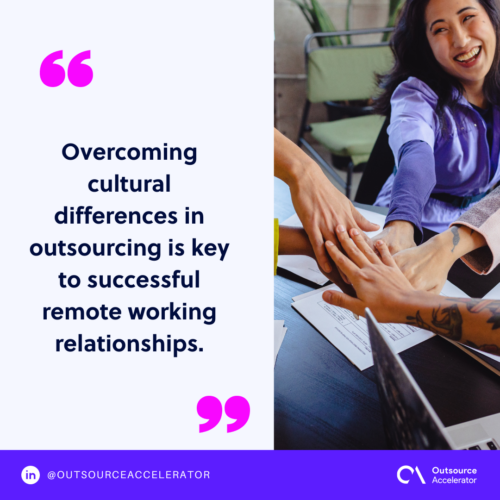Overcoming cultural differences in outsourcing

This article is a submission by Clark Staff. Clark Staff is an American-owned remote staffing company that has successfully operated since 2003. Its primary objective is to empower small and mid-sized companies by providing them with resources that were once exclusively accessible to Fortune 500 companies.
It is no secret that outsourcing tasks and processes to overseas service vendors provide access to skilled talent at lower costs. These cost-savings don’t sacrifice quality because many of these countries that companies choose to outsource have a vast talent pool.
However, cultural differences in outsourcing can complicate working across borders.
The semiotics and syntax clearly play an important role in conveying information, which is why being constantly conscious and aware of the things you say and do matters.
Misunderstandings rooted in contrasting cultural norms lead to communication breakdowns, process failures, and unsatisfactory results. Failing to invest in bridging cultural gaps puts outsourcing success at risk.
But of course, these outsourced workers are also trained on how to adjust to your culture as well but it’s also nice to have a little knowledge on how to deal with your remote staff to enable a more harmonious relationship.
14 ways to overcome cultural differences in outsourcing
Here are some tips for understanding and aligning cultural differences to enable effective outsourcing across borders:
1. Research local cultures
Doing basic research on the local history, values, etiquette, and business culture in key outsourcing geographic locations pays dividends.
Understanding potential differences in areas like formality, hierarchy, decision-making, and work-life balance is key in cross-cultural outsourcing.

2. Tailor communication styles
Adjusting communication patterns to align with outsourcing partner preferences can be great.
High-contextual cultures like the Philippines, value relationship-building. On the other hand, small talk is not valued in low-context culture Germany.
Adapt a degree of directness, use idioms, and deal with conflicts and the cadence of conversations. Non-verbal communications also take different meanings across cultures.
3. Bridge hierarchy gaps
Some cultures have greater deference to hierarchy than others. Seniority carries authority in Confucian cultures, unlike more egalitarian Western norms.
Navigating reporting structures, involving decision-makers, and escalation protocols correctly makes or breaks collaboration.
4. Account for work ethic variations
Work ethic differences can impact expectations, deadlines, work hours, leave policies, and accountability.
Japanese professionals expect input on big decisions but Filipinos’ hiya (shame) drives avoidance of failure making them quiet on such occasions. However, outsourcing partners in the Philippines are training their staff to avoid this.
Understanding what motivates workers locally improves alignment more.
5. Allow sufficient on-boarding time
Don’t assume your remote staff will hit the ground running after you employ them.
Additional onboarding helps establish context and capabilities. Investing 4-8 weeks upfront in knowledge transfer avoids mismatched expectations and unproductive churn later.
Your partner outsourcing company can help you provide this knowledge transfer much faster when done right.
6. Clarify requirements and deliverables
Cultural differences can lead to divergent interpretations of requirements if not spelled out explicitly.
Clearly defining expectations avoids ambiguities. Low-context cultures want granular project plans while high-context peers favor flexibility. Striking the right balance can help you define the objectives more.
7. Translate documents
Reduce comprehension gaps by providing key documents like contracts and process manuals professionally translated into local languages if necessary. Nuances get lost translating technical materials internally.
Professional translation services are worth the investment. However, a partner BPO company can help you with explaining it.
8. Monitor indirect cues
Look for indirect cues of issues like ambiguity, lack of understanding, or discomfort with your outsourced workers. Not all cultures openly voice concerns directly.
Signs of problems include missed deadlines, extended delays in responding, or withdrawals from collaboration. Address issues promptly to enable a more collaborative work environment with your remote staff.
9. Invest in cultural training
Culture training prepares internal teams to collaborate effectively with offshore partners. Learning basic etiquette helps avoid embarrassing gaffes.
Training should cover business culture, key values like Individualism vs. Collectivism, formality norms, and workplace motivations.
BPO companies are aware of this gap which is why some of them established their own training and development departments solely focusing on this.

10. Share key events calendars
Share calendars of major holidays, festivals, and other significant events in each country. Schedule meetings and deadlines to avoid conflicts.
Being insensitive regarding local traditions can damage engagement, respecting important occasions of your outsourced staff is also key in building a mutually respecting environment.
11. Don’t stereotype individuals
On the other hand, you should avoid homogenizing outsourcing professionals based on cultural research that you found. Individual diversity exists within each location.
Take time to understand individual styles, communication preferences, and capabilities. Personal rapport also matters in creating a harmonious working environment and bridging cultural differences in outsourcing.
12. Prioritize visits both ways
Make the effort to visit your outsourced locations and BPO partners and invite their teams onsite when possible.
Face-to-face meetings build trust and immersion trips provide experiential cultural learning while working tours enable better requirements understanding.
13. Learn some local language
When working frequently with an offshore location, pick up some basic vocabulary in the local language. Using native greetings and courtesies gains goodwill. Just learning to pronounce your remote staff names properly shows respect.
14. Keep an open mind
Check your own cultural assumptions at the door. There are benefits in how outsourcing regions approach problems differently.
Avoid reflexively dismissing foreign practices. Different doesn’t mean wrong. Continuous learning works both ways so you gotta pay attention and keep an open mind.
Beat cultural differences in outsourcing
Overcoming cultural differences in outsourcing is key to successful remote working relationships. You should research your partners’ local norms and adapt approaches for better alignment.

You should avoid stereotypes and learn some basics of local languages to show interest. While outsourced teams adjust to Western practices, clients should also be flexible on:
- Communication styles
- Hierarchy
- Motivation
- Work ethics
Tailoring to close divisions builds rapport. This awareness takes effort but pays off.
Outsourcing thrives when partners commit to bridging divides and gaining efficiencies and perspective. With a focus on aligning norms and motivations, outsourcing can work across geographical distances.
Small gestures like properly pronouncing names build goodwill. In-person meetings build trust and contextual immersion. Over time, you integrate cultural strengths.
Outsourcing works best when grounded in empathy, adaptability, and respect. Investing in understanding global diversity expands horizons. Navigating initial differences provides long-term benefits.
Aligning outlooks and work styles enables smooth collaboration and cultural blending. Clients access worldwide talent while staff get new opportunities.
Cross-cultural understanding is key for mutually beneficial outsourcing relationships.







 Independent
Independent




